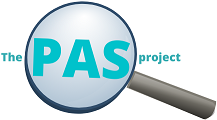The PAS project

The Phonological Awareness for Speech (PAS) project
The PAS project is a research study currently being carried out by Jo Baker, a Speech and Language Therapist and PhD candidate at Newcastle University. The project is supervised by Dr Helen Stringer and Professor Cristina McKean.
Project summary:
- Speech sound disorder (SSD) is when children have difficulty producing speech sounds correctly, making their speech difficult to understand.
- Phonological disorder is a type of speech sound disorder. Children with SSD are at risk of long-term academic and socioemotional difficulties making early identification and intervention from a Speech and Language Therapist crucial.
- There are multiple evidence-based interventions for phonological disorder, one being phonological awareness intervention.
- Phonological awareness intervention is widely provided to children with phonological disorder and current evidence has shown that it helps to resolve speech production errors in some children with phonological disorder.
- However, not all children respond to phonological awareness intervention in the same way and the relationship between speech production and phonological awareness is unclear. The aim of this project is to investigate the effects of phonological awareness intervention on the speech production of children with phonological disorder.
What will happen in this project?
- WHO? Children aged 3,11 to 5,11 years with phonological disorder will be recruited through Speech and Language Therapy services in the North East.
- The children will take part in an experimental study consisting of three phases.
- 1. In phase one the children will be assessed on measures of speech and language.
- 2. In phase two the children will receive phonological awareness intervention in small groups for 12 weeks.
- 3. In phase three the children’s speech and language will be re-assessed after a 12-week break following intervention.
- Outcomes will be analysed to inform whether children who produce different types of speech errors, termed phonological error processes, respond differentially to the intervention. Additionally, outcomes from children with two sub-types of phonological disorder (consistent and inconsistent) will be compared. We predict that the outcomes will support clinical decision-making, helping clinicians to identify which children are most likely to benefit from this intervention approach.
Associated links:
Study registration DOI: https://doi.org/10.17605/OSF.IO/2RCJE
Twitter: JoBakerSLT
